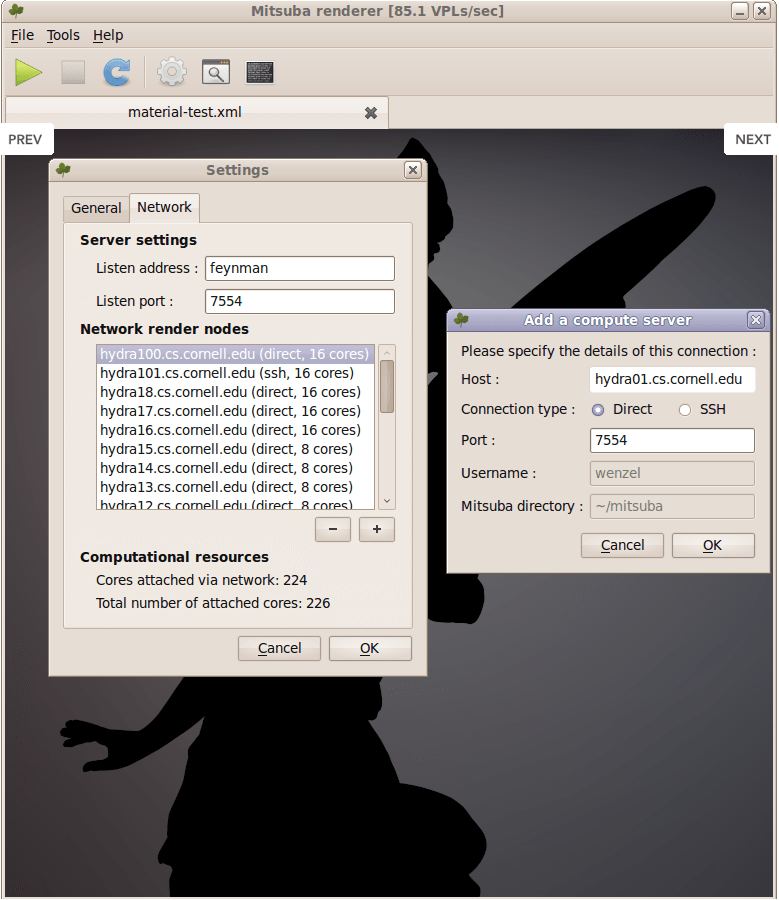Mitsuba is an extensible rendering framework written in portable C++. It implements unbiased as well as biased techniques and contains heavy optimizations targeted towards current CPU architectures.
Mitsuba comes with a command-line interface as well as a graphical frontend to interactively explore scenes. While navigating, a rough preview is shown that becomes increasingly accurate as soon as all movements are stopped. Once a viewpoint has been chosen, a wide range of rendering techniques can be used to generate images, and their parameters can be tuned from within the program.
Mitsuba can transparently distribute work over a cluster without the need for a shared filesystem. Most implemented algorithms can be run in parallel over massive numbers of networked cores.
Features include:
- Available rendering techniques:
- Direct illumination.
- Monte-Carlo path tracer which solves the full Radiative Transfer Equation.
- Photon mapper with irradiance gradients.
- Adjoint particle tracer.
- Instant Radiosity (hardware-accelerated).
- Progressive Photon Mapper.
- Stochastic Progressive Photon Mapper.
- Veach-style Bidirectional Path Tracer.
- Kelemen-style Metropolis Light Transport.
- Veach-style Metropolis Light Transport.
- Supports the most commonly used scattering models: Lambertian surfaces, ideal dielectrics & mirrors as well as the the Phong & anisotropic Ward BRDFs.
- Compute global illumination solutions in scenes containing large isotropic or anisotropic participating media.
- Internally uses a O(n log n) SAH kd-tree compiler with support for primitive clipping (aka. perfect splits). The ray tracing core is built on Havran’s fast traversal algorithm.
- Data exchange with the major modeling packages is supported using the COLLADA file format. Mitsuba can read DAE files and convert them into its native XML-based file format.
- Spectral rendering, black body radiation and dispersion.
- Customizable image reconstruction filters.
- High dynamic-range input/output using the OpenEXR format.
- Deterministic Quasi-Monte Carlo sampling.
- Adaptive integration.
- Depth of field.
Website: www.mitsuba-renderer.org
Support: Documentation
Developer: Wenzel Jakob
License: GNU General Public License v3.0

Mitsuba is written in C++. Learn C++ with our recommended free books and free tutorials.
| Popular series | |
|---|---|
| The largest compilation of the best free and open source software in the universe. Each article is supplied with a legendary ratings chart helping you to make informed decisions. | |
| Hundreds of in-depth reviews offering our unbiased and expert opinion on software. We offer helpful and impartial information. | |
| The Big List of Active Linux Distros is a large compilation of actively developed Linux distributions. | |
| Replace proprietary software with open source alternatives: Google, Microsoft, Apple, Adobe, IBM, Autodesk, Oracle, Atlassian, Corel, Cisco, Intuit, SAS, Progress, Salesforce, and Citrix | |
| Awesome Free Linux Games Tools showcases a series of tools that making gaming on Linux a more pleasurable experience. This is a new series. | |
| Machine Learning explores practical applications of machine learning and deep learning from a Linux perspective. We've written reviews of more than 40 self-hosted apps. All are free and open source. | |
| New to Linux? Read our Linux for Starters series. We start right at the basics and teach you everything you need to know to get started with Linux. | |
| Alternatives to popular CLI tools showcases essential tools that are modern replacements for core Linux utilities. | |
| Essential Linux system tools focuses on small, indispensable utilities, useful for system administrators as well as regular users. | |
| Linux utilities to maximise your productivity. Small, indispensable tools, useful for anyone running a Linux machine. | |
| Surveys popular streaming services from a Linux perspective: Amazon Music Unlimited, Myuzi, Spotify, Deezer, Tidal. | |
| Saving Money with Linux looks at how you can reduce your energy bills running Linux. | |
| Home computers became commonplace in the 1980s. Emulate home computers including the Commodore 64, Amiga, Atari ST, ZX81, Amstrad CPC, and ZX Spectrum. | |
| Now and Then examines how promising open source software fared over the years. It can be a bumpy ride. | |
| Linux at Home looks at a range of home activities where Linux can play its part, making the most of our time at home, keeping active and engaged. | |
| Linux Candy reveals the lighter side of Linux. Have some fun and escape from the daily drudgery. | |
| Getting Started with Docker helps you master Docker, a set of platform as a service products that delivers software in packages called containers. | |
| Best Free Android Apps. We showcase free Android apps that are definitely worth downloading. There's a strict eligibility criteria for inclusion in this series. | |
| These best free books accelerate your learning of every programming language. Learn a new language today! | |
| These free tutorials offer the perfect tonic to our free programming books series. | |
| Linux Around The World showcases usergroups that are relevant to Linux enthusiasts. Great ways to meet up with fellow enthusiasts. | |
| Stars and Stripes is an occasional series looking at the impact of Linux in the USA. | |
